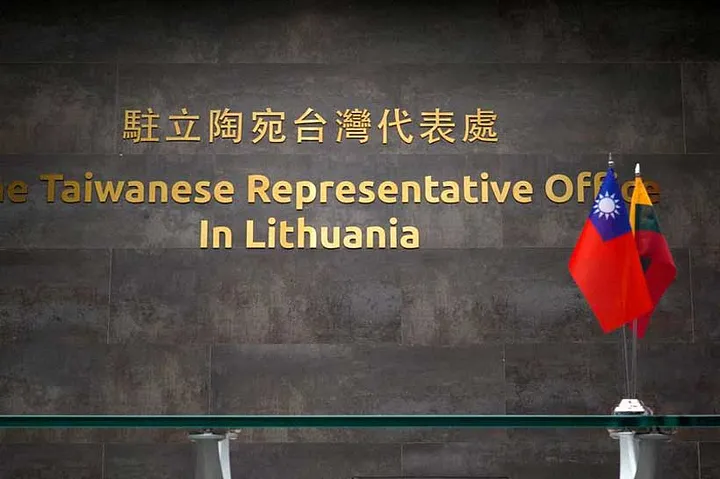By: Brian Iselin, Associate Editor
Taiwan’s dithering in Lithuania is a diplomatic failure of significance — a self-inflicted wound that threatens to haemorrhage its credibility among the few European allies bold enough to defy Beijing. When Lithuania’s last administration allowed Taiwan to open its representative office in Vilnius in 2021, branded with the incendiary label “Taiwanese” rather than the anodyne “Taipei,” it was a rare act of geopolitical courage. Beijing retaliated by slashing trade and diplomatic ties, leaving Lithuania isolated. In return, Taiwan pledged economic cooperation: semiconductor plants, investment, a bridgehead into Europe. Four years later, that bridgehead can be said to be little more than a ghost town, and Lithuania is left deflated after withstanding a massive trade shock that would have broken many countries.
Lithuanian Prime Minister Gintautas Palucas and Seimas Speaker Saulius Skvernelis now openly admit that Taiwan’s promises have evaporated. “We should have had five chip factories by now,” Skvernelis scoffed. Instead, Lithuania has a single 14 million euro semiconductor deal with Teltonika — a partnership that, while ground-breaking, remains a pebble when a boulder was promised. Taiwan’s Industrial Technology Research Institute (ITRI) transferred licenses to Teltonika, but production won’t begin until 2027. Four years of waiting for a trickle of technology. Is this how Taiwan rewards allies who risk Beijing’s wrath?
Semiconductors are Taiwan’s crown jewels, the linchpin of its global influence. If it cannot deliver concrete investments — factories breaking ground, supply chains materialising — its claims of solidarity with democracies ring hollow. Lithuania isn’t asking for charity. It’s demanding reciprocity. Taiwan must pour billions, not millions, into Baltic semiconductor hubs, accelerating timelines and bypassing bureaucratic inertia. Every month delayed is a month China spends eroding Lithuania’s resolve. Beijing has already dangled the carrot of “normalisation” talks. How long before Vilnius capitulates, weary of empty Taiwanese pledges? Already there is talk in Brussels that the last administration simply overstepped and the let-down was predictable. And it will unravel unless follow-up is serious. I heard one “Brussels Bubble” insider saying it was deserved for their “adventurism”. This kind of dismissal is what can happen in Brussels when you try to lead the EU on an issue on which there is no clear consensus.
But money alone won’t suffice. Taiwan’s soft power in Europe is dwarfed by the massed forces of China in Europe. The EU-Taiwan Forum, launched in 2025, is a start — a formal closed.-door Brussels event with panels on “defence partnerships” and “resilient supply chains”. But forums are talk shops, unless they lead to policy outcomes and changed perspectives. What Taiwan needs to advance on any outcomes of the Forum is permanent institutions: think tanks embedded in European capitals, scholarships flooding universities with pro-Taiwan academics, and cultural exchanges that humanise the island beyond its chip factories. The new but as-yet underfunded EU-Taiwan Institute aims to play this role — host for track 2 dialogue, policy research, networking building. But where is the support from Taipei? Both the Forum and the Institute are very rare instances of initiatives that should flood Europe with narratives that frame Taiwan not as a “problem” but as a beacon of innovation and democracy.
Are Taiwan’s diplomats oblivious to urgency? They tout the Vilnius office as a triumph, but triumph without substance is a Potemkin village. When Skvernelis laments the “exaggerated optimism” masking “adventurism in foreign policy,” he’s accusing Taiwan of performative diplomacy. Needless to say, this is very, very bad for Taiwan. And should never have been allowed to happen. Allies are in too short supply to allow goodwill to die exposed on the side of a hill. Performance without follow-through is a recipe for betrayal. Europe’s support for Taiwan is conditional, tethered to the island’s willingness to act like the sovereign nation it claims to be. Sovereign nations invest. They build. They defend allies.
Crucially in this strategic calculus to conquer European hearts and minds, China isn’t idle. It’s leveraging trade, threats, and subterranean diplomacy to peel Lithuania back into its orbit. China has dramatically expended its thinktank presence across the Continent; so many they have their own umbrella networks to coordinate. My observation is that Taipei acts like time is on their side. It isn’t. Democracies have short memories and shorter attention spans especially with things like tariff wars and actual, border wars to worry about. Lithuania’s frustration is a warning: without immediate, tangible commitments, Taiwan’s European alliances will crumble like sandcastles at high tide. Time to invest and invest big.
Lithuania lost 100s of millions of Euros in taking on China, eventually having to be bailed out by EU allies. It was a huge risk they took. Courageous, in the words of Sir Humphrey. And now Taiwan must choose: Will it be a nation that stands tall, or a supplicant that hesitates? The clock ticks. The factories remain unbuilt. And Beijing’s shadow looms.



